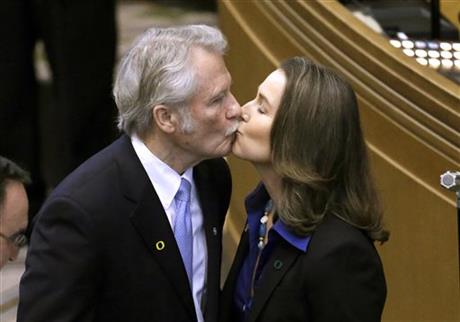
By JONATHAN J. COOPER
Oregon Gov. John Kitzhaber announced his resignation Friday over a deepening influence-peddling scandal surrounding his fiancée and on the same day the U.S. Attorney’s Office issued a subpoena demanding records and electronic communications pertaining to the pair.
The subpoena was the first acknowledgment of a federal investigation against Kitzhaber and Cylvia Hayes. It marks yet another turn in a scandal that brought down Oregon’s longest-serving chief executive.
Kitzhaber’s resignation, which is to take effect Wednesday, cleared the way for Secretary of State Kate Brown to assume Oregon’s highest office and become the nation’s first openly bisexual governor.
Kitzhaber insisted he broke no laws.
“Nonetheless, I understand that I have become a liability to the very institutions and policies to which I have dedicated my career and, indeed, my entire adult life,” he said in a statement.
The announcement of the planned resignation capped a wild week in which Kitzhaber seemed poised to step down, then changed his mind, but ultimately bowed to calls from legislative leaders that he quit.
It’s a stunning fall from grace for a politician who left the governor’s office in 2003 and then mounted a comeback in 2010 and returned to his old job.
“This is a sad day for Oregon. But I am confident that legislators are ready to come together to move Oregon forward,” said Brown, also a Democrat. Unlike most states, Oregon does not have a lieutenant governor. The secretary of state is next in line to succeed the governor.
The subpoena — served on the state Department of Administrative Services — demands records not just pertaining to the pair, but also to 15 others. They are people involved with the Kitzhaber administration and with companies Hayes did business with as a consultant while she was also working as an adviser to the governor.
The subpoena orders the agency to produce documents for a federal grand jury before March 10.
A spokesman for the agency, Matt Shelby, said the subpoena was received Friday afternoon. He said the agency would provide whatever requested records are in its possession.
The Oregon attorney general, a Democrat like Kitzhaber, said she planned to continue a criminal investigation of the governor and Hayes.
The subpoena seeks records pertaining to 15 other people besides Kitzhaber and Hayes. They include Kitzhaber’s chief of staff, policy advisers, Kitzhaber’s lawyer and secretaries.
The records to be turned over include those on contracts awarded to Hayes, records of payments, minutes of meetings and other material.
In addition to the written statement, Kitzhaber released audio of himself reading from it. At the end, his voice trembled, and he seemed to choke back tears.
His statement was defiant, saying it was “troubling” that “so many of my former allies” had chosen to “simply accept” that he had done something wrong, probably referring to other Democrats who did not come to his aid as pressure grew.
Kitzhaber called Brown back to Oregon from a conference in Washington, D.C., earlier this week. People close to Kitzhaber say he asked her to return after deciding to resign but then changed his mind. That led to a Wednesday meeting between Kitzhaber and Brown that she described as “strange.”
By Thursday, the leaders of the state House and Senate said he had to go. Other top officials in the overwhelmingly Democratic state also said Kitzhaber should resign.
“I finally said, ‘This has got to stop,'” Senate President Peter Courtney said after he met with Kitzhaber.
Kitzhaber handily won re-election in November to a fourth term after surviving the botched rollout of Oregon’s online health care exchange.
But the allegations surrounding the work of his fiancee were more damaging, dominating headlines in the state following his victory.
A series of newspaper reports since October have chronicled Hayes’ work for organizations with an interest in Oregon public policy. At the same time, she was paid by advocacy groups and played an active role in Kitzhaber’s administration, a potential conflict of interest.
The spotlight on Hayes led her to reveal that she accepted about $5,000 to illegally marry a man seeking immigration benefits in the 1990s. Later, she admitted she bought a remote property with the intent to grow marijuana.
A fiercely private person, Kitzhaber has been forced to answer embarrassing and personal questions about his relationship. In response to questions at a news conference last month, Kitzhaber told reporters that he’s in love with Hayes, but he’s not blinded by it.
Kitzhaber, 67, met Hayes, 47, before the 2002 election, when he was governor and she was a candidate for the state Legislature. She lost her race, but they later reconnected after Kitzhaber’s term ended.
Hayes used the title “first lady,” though the couple never married, and she took an active role in his administration. They were engaged last summer.
Before the health care debacle, Kitzhaber had racked up a series of successes.
The former emergency room doctor persuaded lawmakers to overhaul the state Medicaid system, then persuaded the Obama administration to give Oregon $2 billion to implement it. He spearheaded cuts to retirement benefits for public employees, despite being elected with considerable help from unions whose members lost out.



